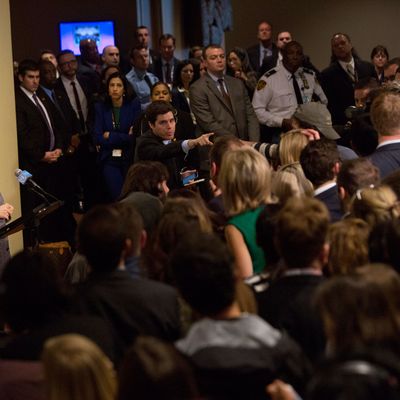
Hillary Clinton’s email saga, which lasted three whole weeks and generated deep investigations into the arcana of government archiving protocol and “homebrew” email systems, seemed to trigger a form of posttraumatic Clinton syndrome for everyone involved. “Early in 2016 Race, Clinton’s Toughest Foe Appears to Be the News Media,” the New York Times wrote. “Hillary Clinton’s Media Demons Return to Haunt Her — Loudly,” the Daily Beast declared. “The media sh**t-show is back: Why coverage of Hillary Clinton has been an embarrassment,” Salon said. The litany of grievances against the media that Clinton has accumulated over her two decades of political life was exhumed: from the Whitewater witch hunt to her husband’s infidelities to her belief that reporters were in the tank for Obama in 2012. “Look. She hates you. Period. That’s never going to change,” one Clinton campaign veteran told Politico last year.
It was a depressing preview of what could come in 2016, not just for Clinton but for the reporters covering her, too. The Clinton beat is notoriously hard, and many of the scribes who did it in 2008, when her campaign’s relationship to the media was toxic, have scars to show. The reporters thought she was cool and imperious; her press shop treated them like they had “big egos and no brains.” Joshua Green, who wrote a lengthy Clinton profile for The Atlantic in 2006, which challenged her inevitability as the nominee, remembers being told by Clinton’s advisers after the profile came out that he’d ruined his career. It didn’t stop him, after she lost the primary to Barack Obama two years later, from getting several former Clinton hands to leak documents for a piece that painted a vivid picture of the campaign’s dysfunction. After it fell apart, Jonathan Alter said it was “the worst press operation — for their candidate as well as for the media — of any Democratic campaign I’ve covered in 25 years.” Glenn Thrush, chief national correspondent at Politico, describing the psychological toll of covering the Clinton campaign in a story last year, wrote, “The veterans removed themselves from the road to preserve their sanity … At least one reporter was involuntarily pulled out of action by his editors for fear he was about to collapse. One of the country’s most respected political scribes took to travelling with a shoebox crammed with various over-the-counter meds because the stress and sleep deprivation was running down her immune system.”
It’s not all Clinton’s fault. She’s stepping into a campaign cycle as the most high-profile non-incumbent to run in recent campaign history, and the media’s demand for stories about her is insatiable. At the same time, says Ron Fournier, who covered a much more accessible Bill Clinton for the AP when he made his bid for the White House, “in every cycle, the access we get to principals and people around them has shrunk.”
Major news outlets first started assigning reporters to the Hillary-as-presidential-candidate beat in 2013, even though her campaign still doesn’t technically exist. “People make a big deal about the abuse that Clintonworld is known to bestow on the press, but so far it’s been mostly neglect,” one reporter now covering her told me last week. “The biggest frustration — so far, at least — is that she’s eager to preserve the fiction that she’s a private citizen. So she has no press team, no public calendar, no rapid-response capability, no policy shop, etc. So her team has to triage the barrage of incoming requests, and the vast majority don’t get answered substantively.”
The irony of the tension between Hillary and the media is that reporters actually seem to like the candidate herself. “There’s clearly a part of her and her team who see the press as adversaries … but Hillary is great with the press. We could never figure it out when they were keeping her from us,” says Beth Fouhy, who was the lead AP reporter covering Hillary Clinton in 2008 and now is leading the team of campaign reporters covering the 2016 race for MSNBC. “She’s smart, funny, warm, she knows the reporters who cover her, and she gets along with them perfectly fine.”
Reporters are scanning Clinton’s early hires for signs that she has learned from 2008 — and at the moment, they’re hopeful. Last week, the New York Times reported that Clinton was bringing on Jesse Ferguson, a Democratic Congressional Campaign Committee spokesman, to serve as one of her campaign spokesmen. He’ll be working with Jennifer Palmieri, the current White House communications director. Neither are Clinton veterans and both have strong relationships with the press, suggesting that Clinton is determined not to repeat the mistakes of her last campaign. Thrush thinks that the lack of a real primary challenge in 2016 may ameliorate some of the tensions that spilled over in 2008, when the Clinton campaign was furious with the media for what they felt was favorable coverage of Barack Obama. “She’s always wanted to run a general election campaign against Republicans, so you may get a happy warrior this time,” he told me.
The beat reporters will have to wait a few more weeks to find out. “Until she announces,” one of them told me, a bit wistfully, “they don’t even have the time to abuse you.”





























